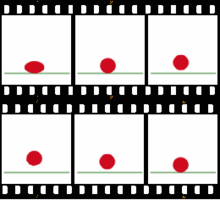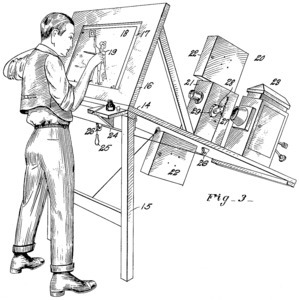
Back بوابة:رسوم متحركة Arabic دەروازە:ئەنیمەیشن CKB Portal:Animation German درگاه:پویانمایی Persian Portail:Animation French Portale:Animazione Italian Portal:アニメ Japanese 포털:애니메이션 Korean Portal:Animação Portuguese Портал:Мультипликация Russian

| Main | Categories and topics | Tasks and projects |
Introduction
Animation is a filmmaking technique by which still images are manipulated to create moving images. In traditional animation, images are drawn or painted by hand on transparent celluloid sheets (cels) to be photographed and exhibited on film. Animation has been recognized as an artistic medium, specifically within the entertainment industry. Many animations are computer animations made with computer-generated imagery (CGI). Stop motion animation, in particular claymation, has continued to exist alongside these other forms.
Animation is contrasted with live-action film, although the two do not exist in isolation. Many moviemakers have produced films that are a hybrid of the two. As CGI increasingly approximates photographic imagery, filmmakers can easily composite 3D animations into their film rather than using practical effects for showy visual effects (VFX). (Full article...)
Selected article
Flipnote Studio 3D, known in Japan as Moving Notepad 3D (うごくメモ帳 3D, Ugoku Memochō Surī Dī) and originally announced as Flipnote Memo, is a free downloadable animation application launched in 2013 for the Nintendo 3DS. Developed by Nintendo EAD Tokyo, this successor to Flipnote Studio allows users to use three separate layers to create stereoscopic 3D animations, which can be exported into GIF or AVI format. Flipnote Studio 3D was launched with two online communities: Flipnote Gallery: Friends, and Flipnote Gallery: World. The application was released in Japan on July 24, 2013. It was set for an August 2013 release in North America and Europe, but due to "unexpectedly high" usage of the online services in Japan, the application's release was delayed for both regions.
Selected image
Did you know (auto-generated) -

- ... that at age 12, Shaylee Mansfield became the first deaf actor to be credited alongside the voice actors for a signed performance in an animated production?
- ... that the French animated film The Summit of the Gods is based on a Japanese manga series?
- ... that "Arnold's Christmas", now considered one of the most memorable episodes from the animated series Hey Arnold!, was almost rejected by network executives because it depicted the Vietnam War?
- ... that the 1937 Fleischer Studios strike in New York City was the first major labor strike in the animation industry?
- ... that the creators of the cartoon Jade Armor filmed live-action martial arts stunts to visualize the show's animated action sequences?
- ... that Bruce Timm created most of the character designs for Batman: The Animated Series?
Selected quote
Selected biography
Daniel Louis "Dan" Castellaneta (born October 29, 1957) is an American film, theatre and television actor, comedian, voice artist, singer and television writer. Noted for his long-running role as Homer Simpson on the animated television series The Simpsons, he also voices many other characters on The Simpsons, including Abraham "Grampa" Simpson, Barney Gumble, Krusty the Clown, Groundskeeper Willie, Mayor Quimby and Hans Moleman. Born in the Chicago suburb of Oak Park, Illinois, Castellaneta started taking acting classes at a young age. He would listen to his father's comedy records and do impressions of the artists. The Tracey Ullman Show included a series of animated shorts about a dysfunctional family. Voices were needed for the shorts, so the producers decided to ask Castellaneta to voice Homer. His voice for the character started out as a loose impression of Walter Matthau, but later evolved into a more robust voice. The shorts would eventually be spun off into The Simpsons. Castellaneta has won four Primetime Emmy Awards for Outstanding Voice-Over Performance for his work on the show as well as an Annie Award for Outstanding Individual Achievement in the Field of Animation in 1993.
Selected list
There have been 61 episodes of Avatar: The Last Airbender, an Emmy Award-winning American animated television series written and created by Michael Dante DiMartino (pictured) and Bryan Konietzko. It first aired on February 21, 2005 with a one-hour series premiere and concluded its run with a two-hour TV movie on July 19, 2008. The Avatar franchise refers to each season as a "Book", in which each episode is referred to as a "chapter". Each "Book" takes its name from one of the elements that the protagonist must master: Water, Earth, and Fire. The show's first two seasons each consisted of 20 episodes, while the third season had 21. In addition to the three seasons, there were two recap episodes and three "shorts". The first recap summarized the first eighteen episodes while the second summarized season two. The first self-parody was released via an online flash game. The second and third were released with the Complete Second Season Box Set DVD. The entire series has been released on DVD in both Region One and Region Two.
More did you know...
- ...that Jack-Jack Attack is the first Pixar short not to be given a theatrical release?
- ...that pixel artists are featured in an annual juried art show, "Into the Pixel", at the E3 trade show for computer and video game industries?
- ...that critics praised The Spectacular Spider-Man episode "Natural Selection" for its action and fight sequences?
Anniversaries for June 20
- Films released
- 1953 – Hare Trimmed (United States)
- 1969 – Extinct Pink (United States)
- 2006 – Superman: Brainiac Attacks (DC Comics, Warner Bros., United States)
- Television series and specials
- 2004 – Fatherhood, an American animated television series begins airing on Nick at Nite
- 2011 – Rated A for Awesome , an American/Canadian animated television series begins airing on Disney XD
- Births
- 1951 – Tress MacNeille, American voice actress
Subportals
Related portals
Wikimedia
The following Wikimedia Foundation sister projects provide more on this subject:
-
Commons
Free media repository -
Wikibooks
Free textbooks and manuals -
Wikidata
Free knowledge base -
Wikinews
Free-content news -
Wikiquote
Collection of quotations -
Wikisource
Free-content library -
Wikiversity
Free learning tools -
Wiktionary
Dictionary and thesaurus























